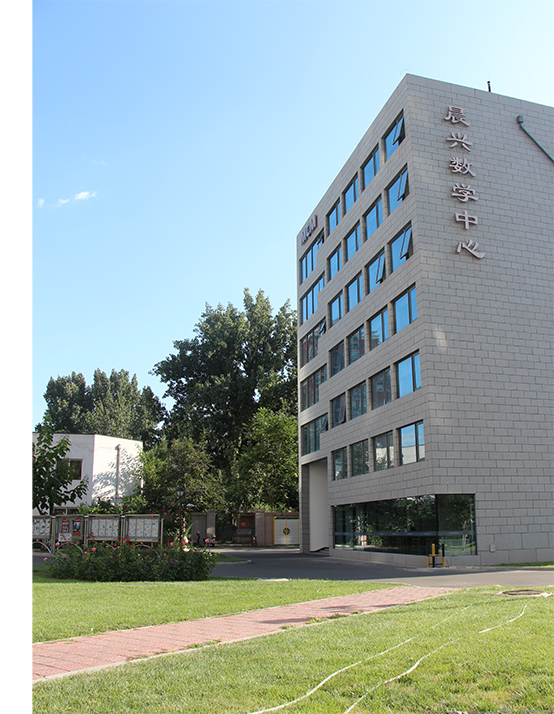
The Founding of the MCM

The Morningside Center of Mathematics was formally established in June of 1996, after nearly one year of discussion and preparation amongst President Lu Yongxiang of the Chinese Academy of Sciences, Professor S.T.Yau of Harvard University and Mr. Ronnie Chan, the Chairman of the Morningside Group. The goal of the MCM is to gradually become a thriving center of mathematical research, which provides training young, talented mathematicians while fostering extensive mathematical exchange, both within the center itself and throughout the mathematical community at large. It was expected that, after many years of strenuous effort, the MCM would emerge as a vital institution for mathematical research and education in China, as well as establish itself as a key actor on the world stage, much like the Institute for Advanced Study at Princeton.
In 1997, the MCM initiated six projects exploring topics such as arithmetic algebraic geometry, geometric analysis, and partial differential equations. In the following year, in addition to pursuing these six expansive projects, the MCM hosted the first International Congress of Chinese Mathematicians in Beijing, which brought over four hundred mathematicians from outside of Asia, Mainland China, Hong Kong, Macau, and Taiwan. Moreover, it assisted the selection committee in deciding on the recipients of the two gold medal and four silver medal winners of the newly created Morningside Prize of Mathematics. Additionally, the Morningside building, which was financially supported by both the Chinese Academy of Sciences and the Morningside Group, was completed in 1998.
Projects Carried Out by the MCM
The MCM normally runs between six and ten projects every year, which are selected by its scientific committee, focusing on the entire spectrum of important fields from pure and applied mathematics to computational mathematics to theoretical physics. For every project, the MCM invites seven or eight excellent, young scholars actively engaged in the relevant field to visit the MCM for roughly six months and to organize seminars on the subject. At the same time, the MCM invites three or four experts, who are recognized authorities in each this field, to give a series of lectures on important issues. Many of project teams also hold workshops upon completion of the projects, which include many more scholars in the relevant fields. Each of these activities are open to scholars, post-doctors, students and the public.
These projects, as well as the associated workshops and conferences, have enjoyed participation from numerous outstanding experts and scholars. Among them are: R. Borcherds, J.P. Bourguignon, Ngo Bao Chau, J.Y. Chemin, J. Coates, D. Gross, R.S. Hamilton, S. Hawking, S. Osher, D.H.Phong, R.Schoen, A. Strominger, Terence Tao, and E. Witten. In addition to this already illustrious list, several Chinese mathematicians have made equally great contributions to these activities carried out by the MCM, including Huai-Dong Cao, Chong-Qing Cheng, Qi Feng, Li-Ming GE, Yi-Zhao Hou, Li-Zhen Ji, Di-Hua Jiang, Yun-Ping Jiang, Tian-Jun Li, C.S. Lin, Ke-Feng Liu, Jun Liu, Chi-Wan Shu, Ye Tian, Da-Qing Wan, Zhou-Ping Xin, Tong-Hai Yang, Ping Zhang, Shou-Wu Zhang, and Xi-Ping Zhu. In fact, over two hundred mathematicians from China and abroad are in attendance at MCM projects every year.
Geometric Analysis, PDEs, and Arithmetic Algebraic Geometry at the MCM
At the inception of many of the projects, Prof. Yau held detailed discussions with the organizational committee members about what topics should be explored, what are the key focal points of the field in question, and which experts should be invited to deliver the series of lectures. As an illustrative example, in 1997 Prof. Yau asked several young scholars involved in the project on geometric analysis to study R. Hamilton’s papers on Ricci flow and subsequently continue researching the subject from this perspective. It turns out that Prof. Yau’s advice was quite sagacious and possessed much foresight. After some time, Xiping Zhu of the Sun Yat-sen University at Guangzhou in China, who actively attended the seminars offered by the MCM, as well as participated in the related activities at the Chinese University of Hong Kong led by Prof. Yau, heeded Yau’s advice and ultimately made considerable progress in this direction. He collaborated with Huai-Dong Cao of Lehigh University in successfully composing an exposition of the complete Hamilton-Perelman proof of the Poincare and geometrization conjectures.
Over the last ten years, the project on partial differential equations shouldered by the MCM has mainly aimed at studying the global regularity of a 3-dimensional, incompressible Navier-Stokes system. The MCM invited experts such as Jean-Yves Chemin to deliver multiple series of lectures in addition to collaborating on research into the relevant topics with their Chinese hosts. In particular, Ping Zhang and his collaborators resolved the global well-posedness of 3-D inhomogeneous Navier-Stokes systems in critical spaces with large initial density and small initial velocity, or small density but with one component of the initial velocity large.
Although China enjoys a fruitful tradition in analytic number theory, including beautiful work done by Luo-Keng Hua, Yuan Wang, and Jing-Run Chen, the research carried out on arithmetic algebraic geometry remained as an essentially blank slate into the mid-nineties. Prof. Yau recognized the importance of this field and so he decided to invite Shouwu Zhang to lead the project on arithmetic algebraic geometry established by the MCM. Through the many intervening years, with the thrust of a significant amount of effort, the MCM has developed a strong group engaged in an investigation of this topic, including Wenwei Li, Binyong Sun, Ye Tian, Yichao Tian, and Weizhe Zheng. In addition to this, the projects and activities directed by the MCM have also trained numerous young scholars who have worked at several universities in Beijing, as well as other parts of China, and have since begun their research in this field.
Activities of the MCM
Besides the above projects on arithmetic algebraic geometry, geometric analysis, and PDEs, the MCM also runs plentiful additional projects on mathematical logic, algebra, number theory, representation theory, differential geometry, topology, complex geometry, complex analysis, harmonic analysis and its applications, dynamical systems, probability theory, coding theory, fractal geometry and its applications, numerical analysis, control theory, mathematical statistics, finance mathematics, mathematical physics, and string theory. Countless scholars and graduate students have benefited greatly from these multifarious projects. They are carried out from about fifty universities located all over China. Myriad experts and scholars from abroad have enjoyed the scientific environment of the MCM and appreciated studying amongst its body of talented students and young scholars.
Occasionally, the MCM organizes large conferences with upwards of four or five hundred participants, sometimes even more. The ICCM in 1998, the conference held in memory of Prof. L.K. Hua on the occasion of his 90th birthday, the conferences on string theory in 2002 and 2006, and the ICCM in 2010 stand as shining examples of such conferences. (The ICCM in 2010 was co-hosted by the Tsinghua Center of Mathematics.) Due to Prof. Yau’s invitation, the string theory conferences held in 2002 and 2006 were even graced by the presence of the famous and legendary physicist S. Hawking. This became a tremendously hot news topic within the Chinese scientific circle, and even throughout the community at large. In 2006, the MCM organized public lectures by Prof. Hawking, as well as David Gross, held in the People’s Great Hall in Beijing. It was a rare occasion to have six thousand audience members sitting in the same hall in order to listen to a scientific lecture.
Morningside Center of Mathematics
In 1998 the Morningside Group based in Hong Kong, chaired by Mr. Ronnie Chan and Mr. Gerald Chan, donated funds to establish the Morningside Medals of Mathematics in order to encourage outstanding young Chinese mathematicians in their pursuit of mathematical truths. Since then the Morningside Medals have become the highest standard of mathematical achievement within the community of Chinese mathematicians throughout the world. When selecting candidates, we emphasize their specific contributions, the originality of their work, and their influence on the field in general. Many outstanding mathematicians were invited to act as members of the selection committee, including P. Bickel, L. Carleson, J. Coates, R. Coifman, S. Donaldson, G. Faltings, J.M. Fontaine, D. Gieseker, R. Graham, B. Gross, R. Hamilton, N. Hitchin, M. Kashiwara, P. Lax, L. Lovasz, S. Osher, D.H. Phong, L. Simon, J. Smoller, T. Spencer, C. Vafa, L. Valiant, S. Varadhan, G. Wahba, and S.T. Yau (chair).